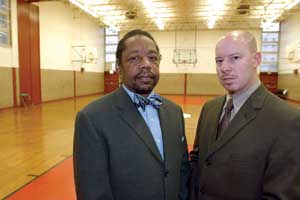Law Professors successfully argue case to protect local citizens’ constitutional rights
By Peter SchulerNews Office
 Randolph Stone (left), Clinical Professor in the Law School, and Craig Futterman (right), Associate Clinical Professor in the Law School, stand in the gymnasium where, in February 2001, Chicago police performed full searches on nearly every individual attending the Stateway Roundball Classic basketball tournament. Futterman was lead council in the Williams v. Brown lawsuit, brought against the city of Chicago by residents of the Stateway Gardens Complex. Collaborating with Stone, Futterman successfully argued that the actions of the police had violated the plaintiffs’ constitutional rights to be free from unreasonable searches and seizures. The city of Chicago settled for $500,000 without conceding wrong-doing. |
“We’re ecstatic and our clients are ecstatic,” said Craig Futterman, in describing the recent $500,000 settlement with the city of Chicago in Williams v. Brown, a lawsuit that arose from a Chicago Police Department raid in February 2001.
Purportedly acting on a tip of imminent gang violence, more than 40 police officers encircled the field house at Stateway Gardens, the Chicago Housing Authority project on south State Street, and ended a basketball game in progress. Over the next two hours, the officers performed full searches on almost everyone present, including babies and young children, and their belongings.
Futterman, Associate Clinical Professor in the Mandel Legal Aid Clinic at the Law School, who founded in 2000 the Police Accountability Project at the clinic, collaborated on the case with Randolph Stone, Clinical Professor in the Law School and a former director of the Mandel Legal Aid Clinic and Cook County public defender, and Tom Peters, a Hyde Park civil rights attorney. More than 20 Chicago Law students worked under their supervision.
“Protecting the rights of the residents at Stateway is the kind of issue the Mandel Legal Aid Clinic has stood for in many different forums over the years,” Stone said. “Hopefully, our participation in this case will foster greater attention to and improvement in police community relations.”
The three attorneys represented pro bono seven specific Stateway residents as well as the other 250 to 300 men, women and children present on the night of the raid, alleging that police had violated their constitutional rights to be free from unreasonable searches and seizures. Assisting them were law students assigned to the clinic and Jamie Kalven, advisor to the Stateway Gardens resident council, and son of the late Law School professor and noted legal scholar Harry Kalven, Jr.
The city of Chicago hired one of the largest law firms in the United States, Jones, Day, Reavis & Poague, to defend the police and had paid the firm more than $1.7 million before the settlement in which the City did not concede wrongdoing.
“The attorneys at the Mandel Legal Aid Clinic can be justifiably proud, not only for their outstanding and generous work on behalf of Stateway residents, but for their commitment to a comprehensive human rights strategy for the residents of public housing,” Kalven said.
Ironically, the evening’s event was the annual Stateway Roundball Classic, a longstanding community institution that was known as an occasion for Stateway’s current and former residents, including gang members, to transcend their divisions by competing together on the basketball court. The event has not been held since the 2001 incident.
“Part of the settlement will go toward community programs at the Field House, including the annual basketball tournaments, that keep people connected,” Futterman said. Since the raid, six of the eight high-rise buildings at Stateway have been demolished, and the remaining two also will be demolished as part of the city’s transformation of almost all the Chicago Housing Authority developments into mixed-income communities.
Another part of the settlement will fund the human rights initiative that Futterman and his University colleagues have pursued with Kalven and Stateway Gardens residents, known as the Stateway Civil Rights Project, to improve police accountability and services to residents.
“This is now run entirely by public housing residents to make sure an incident like this doesn’t happen again,” Futterman said. “The goals are to reform police practices and community relations and to elevate a public housing resident voice around pubic safety issues during the redevelopment process. All eyes will be on Chicago as we address the next wave of public safety issues in the envisioned communities in which the public housing and middle-class residents live side by side.”
Approximately $100,000 of the settlement proceeds will be distributed to the adults and children who were searched and detained at the basketball game. With the exception of the portion of the settlement funds going to the Stateway Civil Rights Project, the remainder will be divided among Tom Peters’ law firm and the Mandel Legal Aid Clinic.
“The attorney fee award to the Clinic will be used to further its mission: to provide quality legal services to those in need and to teach students about justice and what it means to be a lawyer,” said Stone.
Though Futterman said there were many compelling human stories that were part of this civil rights victory, he cites plaintiff Brenda Williams as a particularly passionate champion. In the raid, police not only personally searched Williams, who had been volunteering with young children that day, but they also searched her 1-year-old baby and a diaper bag. Williams died of cancer in July 2003.
“While struggling with her disease,” Futterman said, “she told me that standing up for justice with this case is something incredibly important to her. She wanted to be remembered for giving something back and she truly has.”
![[Chronicle]](/images/sidebar_header_oct06.gif)